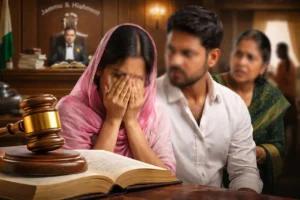The Supreme Court of India, on April 1, refused to entertain a writ petition challenging the validity of Section 4(2) of the Places of Worship Act, 1991. This provision mandates the termination of any legal proceedings regarding the religious character of a place of worship that were initiated before August 15, 1947, upon the Act's commencement.
However, the Court granted the petitioner the liberty to file an application in the pending case challenging the Act, under the lead title Ashwini Kumar Upadhyay v. Union of India.
The Supreme Court is already hearing multiple petitions questioning the validity of the Places of Worship Act, 1991. A bench comprising Chief Justice of India (CJI) Sanjiv Khanna, Justices PV Sanjay Kumar, and KV Viswanathan had, on December 12, issued an order halting fresh suits and survey directives against religious sites.
Read Also:- Supreme Court Withdraws Contempt Order Against Advocate & AoR Following Bar Opposition
When addressing the new petition, CJI Sanjiv Khanna questioned its novelty, stating:
"This is the same plea, what is the difference?"
The petitioner's counsel argued that the petition contained nuanced differences from the existing cases and requested its inclusion in the ongoing batch for consideration. However, the bench declined to entertain the matter further, stating:
"We are not inclined to interfere in the present petition under Article 32 of the Constitution."
Instead, the petitioner was granted permission to move an application within the pending case.
During the December 12 proceedings, the Court directed that in ongoing disputes, such as those concerning the Gyanvapi Mosque, Mathura Shahi Idgah, and Sambhal Jama Masjid, no effective interim or final orders—including those for surveys—should be passed by lower courts.
These interim measures were enacted while hearing petitions challenging the Places of Worship (Special Provisions) Act, 1991, and a separate plea advocating for its strict implementation.
Read Also:- NGT: Nurturing Green for a Sustainable Tomorrow – Vice President Jagdeep Dhankhar
Why is Section 4(2) of the Act Being Challenged?
The primary challenge to Section 4(2) of the Places of Worship Act, 1991, arises from its provision that prevents legal proceedings regarding the religious character of places of worship existing as of August 15, 1947. The key contention is that this section infringes upon fundamental rights under Articles 25, 26, and 29 of the Constitution by preventing communities from reclaiming misappropriated religious properties.
Additionally, the petition argues that the Act contravenes established Hindu law principles, which state:
"Temple property is never lost, even if occupied by others for years. Even the king cannot seize it, as the deity, representing the 'Infinite Timeless', holds perpetual ownership."
Key Arguments in the Petition
The petition argues that Section 4(2) is unconstitutional because:
- It prevents mediation and judicial review, stripping courts of their power to adjudicate religious disputes.
- It constitutes colorable legislation, whereby the legislature overreaches its authority by barring judicial intervention.
- It violates the doctrine of separation of powers, as enshrined in the Constitution.
- It restricts structural changes to places of worship, even if such changes restore the original religious character.
Furthermore, the plea contends that the Act does not define "structural change" as a determinant of religious character. It argues:
"The Place of Worship Act aims to preserve religious character, not the physical structure. Structural modifications should be permissible if they restore the original religious identity of the place."
The petition asserts that religious character is determined by specific rites, rituals, and historical context, rather than mere structural appearances. Therefore, to ascertain the original religious character of certain sites, surveys should be permitted.
Read Also:- Rajasthan High Court Orders Reinstatement of Terminated Hostel-Mess Workers Without Due Process
The petitioner has sought the following declarations from the Supreme Court:
a) Declare Section 4(2) unconstitutional for being arbitrary and violating fundamental rights under Articles 14, 21, 25, and 26 of the Constitution.
b) Clarify that the Places of Worship Act only prohibits religious character conversion, not structural modifications of religious sites.
c) Authorize competent courts to determine the original religious character of places of worship.
d) Grant any other reliefs deemed fit by the Court.
Case Details : NITIN UPADHYAY Versus UNION OF INDIA AND ORS| W.P.(C) No. 202/2025















